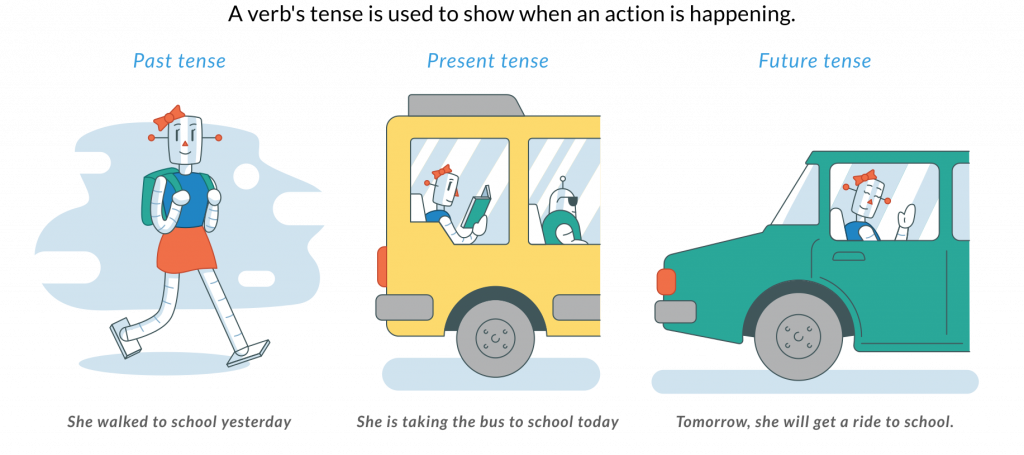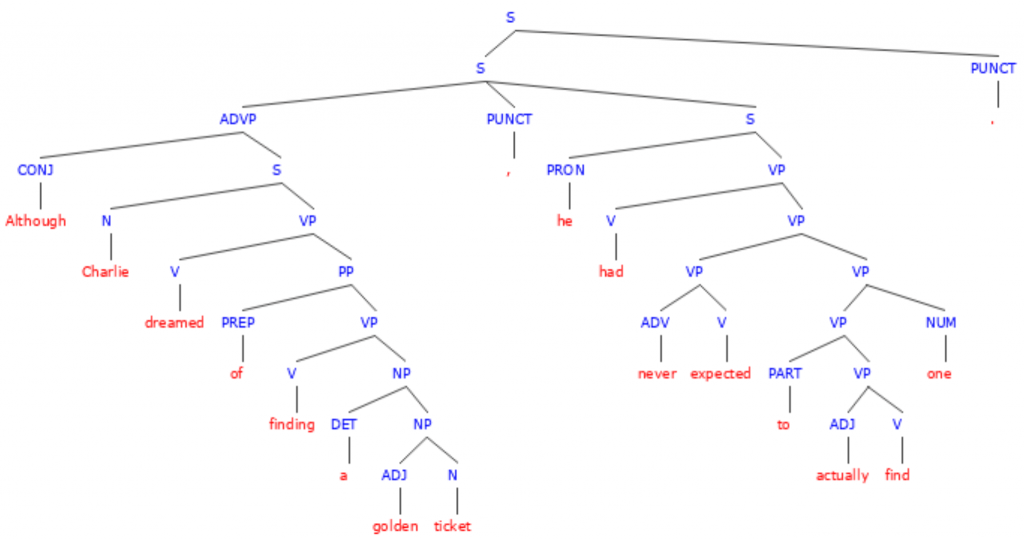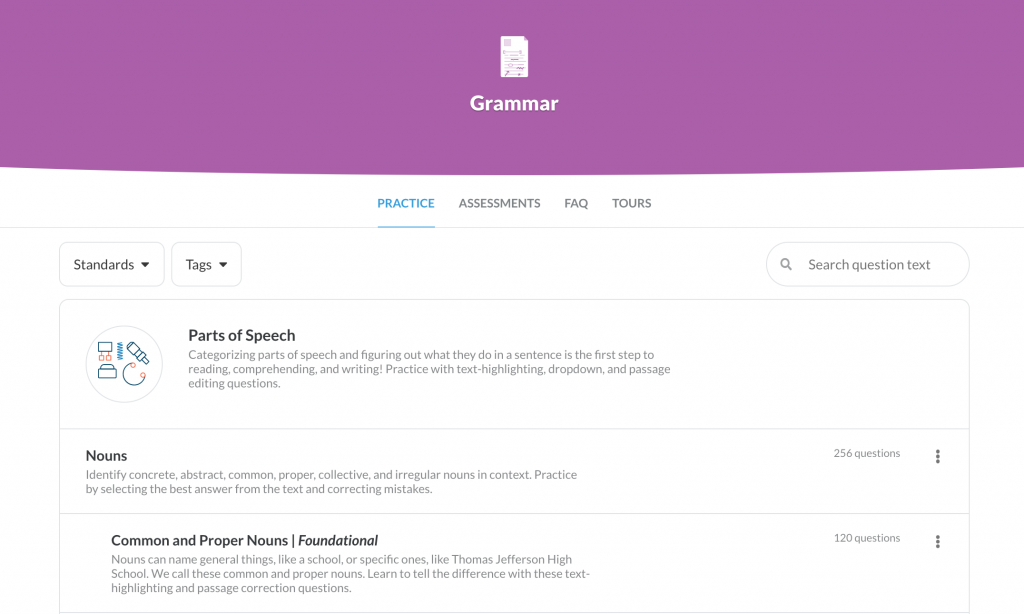Past Tense of Words Ending in Y Reade Between the Lions
We know that verb tense is essential in understanding when the activeness of the sentence was performed, only did you know that in that location are more ways to express tense than but past, present, and future?
While simple verb tense describes when an action was performed, is performed, or will be performed , perfect verb tense expresses when an action was completed, is completed, or will be completed . Although this is a small difference, it is an important one. Uncomplicated verb tense expresses the possibility of an activity happening while perfect verb tense expresses with absolute certainty that the action volition exist completed.
There are some simple verb tenses and progressive verb tenses , also equally some irregular verbs, that practice not follow the rules when changing tense. While this weblog mail service focuses on perfect verb tenses , these other verb tenses can be explored in other blog posts on Albert.
When you're ready, test yourself with a quiz and exercise with our high-quality, standards-aligned questions here .
The Basics of Perfect Verb Tense

What is Perfect Verb Tense?
Perfect verb tense is used to testify an action that is consummate and finished, or perfected . This tense is expressed by adding one of the auxiliary verbs — have, has, or had — to the past participle form of the chief verb.
For case:
- I have seen the movie that was nominated for an Academy Honor.
This sentence expresses that the speaker finished watching a particular picture and did non fall asleep halfway through.
How is By Perfect Verb Tense Used in Writing?
By perfect verb tense is created by calculation accept or had to the by participle form of the verb and is used in four singled-out ways:
ane. To show completed deportment
For example:
- I had just finished brushing my cat when she tore across the thou and jumped into a mud puddle.
In this example, the author wants to emphasize the quick sequence of events every bit her cat went from clean to dirty within a matter of seconds.
ii. To express conditional statements
For case:
- If she had studied for her examination, she would take passed.
In this instance, it is clear that the subject of the sentence did not report for her test, as she did not pass. This sentence proposes a different consequence if the subject field had fabricated a meliorate conclusion.

3. In the class of a question
For example:
- " Have you seen my hairbrush?" Larry asked Bob anxiously.
In this example, Larry is hopeful that Bob saw his hairbrush recently and can help him observe it.
4. As a negative
For case:
He had not missed a single complimentary-throw since the showtime of the flavour.
In this example, "negative" simply means that the word not is added to the past perfect verb phrase. The use of this negative implies that the subject has a perfect free-throw average since he has never missed a shot.
How is Present Perfect Verb Tense Used in Writing?
Present perfect verb tense expresses an action that occurred at an indefinite (or unknown) fourth dimension in the past or an activeness that started in the past and is continuing in the present time.
While past perfect verb tense is created past adding take or had to the past participle form of the verb, present perfect verb tense is created by calculation have or has to the past participle form of the main verb.
For instance:
- The close bond betwixt humans and dogs has continued to be a common theme in both literature and movies.
In this example, the author implies that the theme of dogs as "human's best friend" started at an indefinite or unknown fourth dimension and is however relevant today.

How is Future Perfect Verb Tense Used in Writing?
Futurity perfect verb tense is formed past combining the auxiliary verbs volition+have with the by participle form of the verb. This tense is used to testify actions that either volition exist completed at some point in the futurity or will proceed into the time to come.
It is similar to a Dorsum to the Futurity Two state of affairs. Here's how: essentially when we talk in time to come perfect tense , we are speaking nigh the futurity equally if we have already experienced it and we are looking back on information technology.
In Back to the Future II, the adversary travels to the future and learns the results of every major sporting outcome. When he returns to the present solar day, he builds enormous wealth and power because he can bet with absolute certainty on the outcome of each game throughout his life.
Here is a existent life example:
- When I plow 21, I will have visited all fifty states.
This is a pretty assuming argument, but when nosotros use the futurity perfect tense , we are speaking with the authorisation of someone who knows the time to come to exist true. Perhaps the speaker has already planned a nationwide road trip or already visited 49 states with only one to become. Or, maybe the speaker is but overconfident and should have used a unproblematic future verb tense instead!

Either way, the future perfect verb tense should only exist used when the speaker or writer has absolute conviction that something will be completed or will continue into the future.
What is Perfect Progressive Verb Tense?
The principal difference between perfect verb tense and perfect progressive verb tense is the form of the main verb that is used.
While perfect verb tense pairs an auxiliary verb with a past participle , perfect progressive verb tense combines the aforementioned auxiliary verb with the word been and a present participle catastrophe in -ing .
Here are some helpful definitions and examples:
Past Perfect Progressive: This verb tense describes a past, ongoing action that occurred before another past activeness in fourth dimension.
For example:
- Before her family moved, she had been attending a private school.
Present Perfect Progressive: This verb tense describes an action that started in the by, is continuing now in the present, and may continue into the futurity.
For example:
- He has been dating her for several months.
Hereafter Perfect Progressive: This verb tense describes a future, ongoing activity that will occur before a specified hereafter time.
For example:
- In the next few years, we will take been wearing masks and washing our hands more often than ever before.
Return to the Tabular array of Contents
iii Tips for Understanding Perfect Verb Tense
Hither are some important tips to aid you understand perfect verb tense :

Tip #1. Perfect verb tense is created when the auxiliary verb take, has, or had is paired with the by participle form of the chief verb
For example:
- Past Perfect: Robin Hood had outwitted the Sheriff of Nottingham on endless occasions.
- Present Perfect: Maid Marian has loved Robin Hood ever since they get-go met.
- Future Perfect: Prince John will have cried for his mommy when things practise not go his way.
Tip #2. If the auxiliary verbs have or had are used without a primary verb, they are considered linking verbs and do not limited perfect verb tense
For instance:
- Perfect Verb Tense: I accept watched The Lion King over twenty times.
- Linking Verb ( not perfect verb tense): I have a lovely bunch of coconuts.

Tip #three. Perfect progressive verb tense is a combination of the auxiliary verb phrase have been, has been, or had been and the -ing form of the principal verb
For example:
- Past Perfect: Aladdin had been lying to Jasmine about his true identity.
- Present Perfect: Jafar has been manipulating the male monarch for some time.
- Future Perfect: The Genie will accept been helping his friend, Aladdin, fifty-fifty afterwards being freed.
Render to the Table of Contents
Applying the Basics: Perfect Verb Tense Review & Practice
Now that y'all understand how perfect verb tense functions in sentences, review the ballast nautical chart below and complete the review to fully empathize how to use and recognize perfect verb tense besides every bit how to differentiate information technology from other verb tenses.
The Ultimate Listing of Verb Tenses
Refer to the graphic below to learn the different types of Verb Tenses, including perfect verb tense :

This listing, evidently, does not include all possible verbs and their tenses; yet, it is meant to exist used as a guide while identifying unlike types of verb tenses.
Perfect Verb Tense Exercises and Review
Now that you understand perfect verb tense, test your ability to recognize which verb tense is needed in the sentences below.
Select the correct verb tense in the sentences below. Remember, by perfect verb tense describes events that accept happened in the past, present perfect verb tense describes events that have happened currently, and time to come perfect verb tense describes events will have happened.

ane. Although Charlie dreamed of finding a golden ticket, he has/had/have never expected to really detect one.
In this sentence, had never expected is the right auxiliary to apply to express past perfect tense . You know that past perfect tense is needed because the other verb in this sentence, dreamed , is too in past tense, and verbs must always concord with one some other in tense.
2. No 1 was surprised when Augustus Gloop fell into the chocolate river; he has/had/have been drinking greedily from information technology just moments earlier.
In this judgement, had been drinking is the correct verb to use to express past perfect progressive tense . This verb does a perfect job describing how a continual action in the past led to the electric current action of Augustus falling into the river.
3. When he accompanies Charlie to Wonka's chocolate factory, Grandpa George will has/had/take walked for the start time in twenty years.
In this sentence, will accept walked is the correct verb to apply to express futurity perfect tense . Grandpa George insists on accompanying Charlie to the manufacturing plant, and he is then confident in his decision that he is miraculously able to walk once again.
4. Slugworth has/had/have been searching unsuccessfully for the hugger-mugger behind Wonka'due south Everlasting Gobstopper candy.
In this judgement, has been searching is the correct utilize of the nowadays perfect progressive verb tense . It would not be past perfect progressive tense considering Slugworth has not been successful in his search, pregnant, the search must exist ongoing. Slugworth has searched for this recipe in the past, he has been searching in the present, and he will continue to search for this elusive recipe in the futurity.
5. The Oompa Loompas were a mysterious tribe of people who has/had/have left their home to work for Mr. Wonka in his chocolate factory.
In this judgement, had left is the right past perfect verb tense since the Oompa Loompas left their home for proficient in the past.
Pro Tip :
- Perfect verb tense always expresses an activeness that has either been completed, is being completed, or volition be completed.
- Perfect progressive verb tense expresses an ongoing activeness that was completed in the past, an ongoing action that started in the past, continues in the nowadays, and volition be continued in the future, and an ongoing action that will be completed in the future.
For additional practice, check out Perfect Verb Tense content on Albert.
Return to the Table of Contents
Endeavor for Yourself: Perfect Verb Tense Quiz

Feeling confident in your understanding of Perfect Verb Tense ?
Take this short 6-question quiz to see what you've learned:
one. Which 3 auxiliary verbs are used before the primary verb to testify perfect verb tense?
- Answer: has, take, and had
- Correct Explanation: That's right! Perfect verb tense is shown through the pairing of the auxiliary verb have, has, or had with the main verb.
- Incorrect Explanation: Distressing, that's not right! Remember, perfect verb tense is shown through the pairing of the auxiliary verb have, has, or had with the chief verb.
ii. What catastrophe does the main verb utilize to show perfect progressive tense?
- Answer: -ing
- Correct Explanation: That'due south right! Perfect progressive tense is shown through the combination of the auxiliary verbs accept been, has been, or had been and the -ing form of the primary verb.
- Incorrect Caption: Sad, that's not right! Remember, perfect progressive tense is shown through the combination of the auxiliary verbs take been, has been, or had been and the -ing form of the main verb, while perfect verb tense is shown through the combination of the auxiliary verb have, has, or had with the past participle class of the main verb.
3. In this judgement, is the future tense verb, "volition accept been barking" simple, perfect, or perfect progressive tense?
If he keeps this upward, the neighbor'southward dog will have been barking all night.
- Answer: Perfect Progressive Tense
- Right Caption: That's right! The verb will have been barking is future perfect progressive tense , significant that the speaker believes that the domestic dog will keep the ongoing activeness of barking into the side by side morning.
- Incorrect Caption: Sorry, that'south not right! Remember, perfect progressive verb tenses limited a future, ongoing activity and consist of the auxiliary verb phrase " will have been" combined with the -ing form of the principal verb, which in this instance, is " barking ".
4. In this sentence, is the nowadays tense verb, has witnessed , simple, perfect, or perfect progressive tense?
She has witnessed her get-go-upwards company evolve from a few employees in a single room to a multi-million dollar business with employees stationed around the globe.
- Answer: Perfect Verb Tense
- Correct Caption: That'southward correct! The verb phrase, has witnessed , implies an action that started in the past and continues in the present day. Therefore, this verb is present perfect tense .
- Incorrect Explanation: Sorry, that's not right! Remember, nowadays perfect tense implies an action that started in the past and continues in the present twenty-four hour period and is shown by the combination of the auxiliary verb, has or have , and the by participle grade of the main verb.
5. In this judgement, is the past participle verb, will be attending, unproblematic, perfect, or perfect progressive tense?
They will be attending the awards ceremony this evening.
- Answer: Progressive verb tense
- Right Explanation: That's right! In this sentence, the phrase will be attention implies an ongoing activity that will occur in the future; therefore, a future progressive verb is required.
- Incorrect Explanation: Distressing, that's non right! Call back, future progressive verb tense implies an ongoing activeness that will occur in the time to come, such as, will be attending.
6. In this sentence, is a past perfect or past perfect progressive tense verb needed?
Four years ago I had graduated/had been graduating from my alma mater.
- Answer: bumped: Past Perfect Tense
- Correct Explanation: That's right! Since graduating is an accomplishment that takes identify during the span of only a few hours on a single 24-hour interval, a past perfect tense verb is needed to show that this activity has been completed. A past perfect progressive tense verb would exist incorrect because it implies that the speaker has been graduating from college every day for the past 4 years.
- Wrong Caption: Sorry, that's non correct! Remember, past perfect tense verbs are used to prove that an activeness has been completed in the past, like graduating. A past perfect progressive tense verb would be wrong considering information technology implies that the speaker has been graduating from college every day for the past four years.
For additional practice with Perfect Verb Tense , cheque out our practice on Albert: Perfect Verb Tense .
Return to the Table of Contents
Teacher'south Corner for Perfect Verb Tenses
Fifty-fifty if students empathize that verb tense can be expressed as an action happening in the by, present, or future, it is possible that students may not realize the many other means to express tense that goes beyond the simplest categories. Perfect verb tense is a great case in showing students how subtle changes in verb tense tin can touch on a writer's tone .
For example, a writer stating in uncomplicated hereafter tense that " Elizabeth volition stumble on a pile of rocks and non realize that there is treasure buried underneath " does not give the reader much of a sense of when, or even if, this will happen in the story!
However, if the author uses future perfect tense , the tone of the sentence and possibly the entire story changes: " Although Elizabeth had stumbled on a pile of rocks that morning, she will not accept discovered the treasure hidden underneath these rocks until many years afterwards. "
Suddenly, the story has intrigue because the writer has established an unwavering timeline. Instead of getting bellyaching at Elizabeth in the first judgement for not thinking to look under the rocks, the 2d sentence invests the reader in learning what leads Elizabeth to somewhen uncover this subconscious hoard.
While the Common Cadre English Linguistic communication Progressive Skills Chart provides a broad look at where students should ideally state in their understanding of grammatical concepts, for specific standards on the many dissimilar types of verb tense including perfect verb tense , refer to the Common Core State Standards website.
Albert provides a diversity of verb tense practice assignments, including a Perfect Verb Tense Practise . Albert has besides created set up-to-use assessments and quizzes on a range of grammatical topics that tin be used by educators to rail educatee agreement and progress.
Summary for Perfect Verb Tense
Whenever you want to limited with certainty that an activity was completed, is being completed, or will be completed, use perfect verb tense .
Whenever you want to express an ongoing activeness that was completed, an ongoing, perpetual action that started in the past, continues in the present, and will proceed in the time to come, or an ongoing action that will be completed in the future, employ perfect progressive verb tense .
Be sure to check out our grammar course for more Perfect Verb Tense practice.
You lot can too access over 3,400 high-quality questions that address nearly every grammatical concept.
Need assistance preparing for your Grammar exam?

Albert has hundreds of grammer practice questions with detailed explanations to help you principal concepts.
Source: https://www.albert.io/blog/perfect-verb-tenses/
0 Response to "Past Tense of Words Ending in Y Reade Between the Lions"
Post a Comment